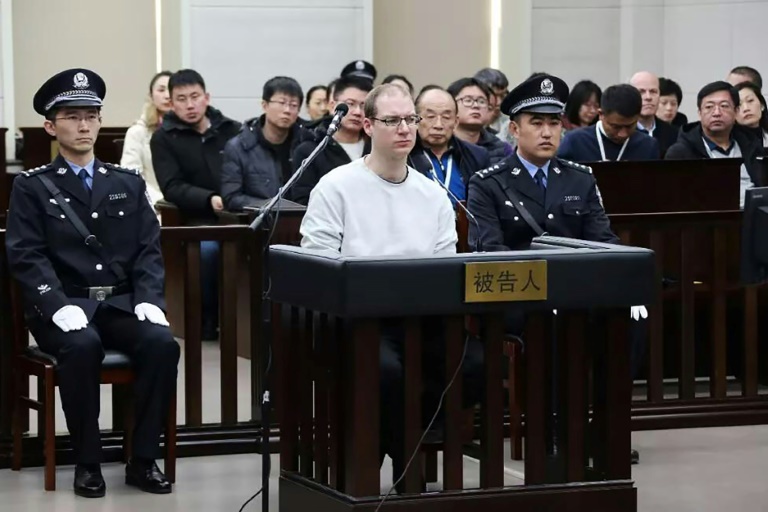
A Chinese court’s decision to impose the death penalty on a convicted Canadian drug smuggler has escalated a diplomatic row that experts say has descended into a high-stakes game of “hostage politics”.
Beijing and Ottawa have been squabbling since last month, when Canada arrested the chief financial officer of top Chinese telecom company Huawei on a US extradition request related to Iran sanctions violations.
In a move observers see as retaliation, Chinese authorities detained two Canadian citizens — a former diplomat and a business consultant — on suspicion of endangering national security.
Then the previously little known case of Robert Lloyd Schellenberg, who was detained in December 2014, suddenly came to the fore.
He had been sentenced to 15 years in prison in November. But a month later, a higher court took up his appeal and ordered a retrial after ruling that the punishment was too lenient.
A new trial was hastily convened in the northeastern city of Dalian where prosecutors presented new evidence and a new witness showing that Schellenberg was connected to an international syndicate that planned to ship 222 kilograms (490 pounds) of methamphetamine to Australia. He claimed he chose the port city for his first China visit as a tourist.
The timing and swiftness of Schellenberg’s sentence, and the inclusion of new evidence presenting him as a key player in the drug deal, raised suspicion among observers.
“Playing hostage politics, China rushes the retrial of a Canadian suspect and sentences him to death in a fairly transparent attempt to pressure Canada to free the Huawei CFO,” Human Rights Watch executive director Kenneth Roth said in a tweet.
Donald Clarke, a George Washington University professor specializing in Chinese law, had an even grimmer term for the situation: “death threat diplomacy”.
“The Chinese government is not even trying to pretend that there was a fair trial here,” Clarke said.
Canadian Prime Minister Justin Trudeau expressed “extreme concern” that China had “chosen to arbitrarily” apply the death penalty.
Ottawa then issued a new travel advisory urging citizens to “exercise a high degree of caution in China due to the risk of arbitrary enforcement of local laws.”
The Chinese foreign ministry has vehemently denied that the case was politicized.
Suspect timing
China executes one or two foreigners every year — nearly all for drug offenses, according to John Kamm, director of the US-based Dui Hua Foundation rights group.
Experts said retrials are rare in China, especially ones calling for a harsher sentence, but rights groups noted that courts are not independent and can be influenced by the ruling Communist Party.
“What’s unusual is how this case shifted from extremely slow handling to suddenly rapid fire movement through the courts,” said Margaret Lewis, a law professor at Seton Hall University.
The rare decision to allow three foreign journalists, including one from AFP, to attend the hearing makes it “clear that the Chinese government wants (the) international spotlight on this case.”
“The timing is suspect and certainly his nationality makes it all the more glaring,” she said.
Meng at home
Schellenberg, who said he was innocent and framed by an acquaintance, has 10 days to appeal to the same high court that rejected his first appeal.
Lewis said the court was likely to confirm the sentence and the case would move up to the Supreme People’s Court.
The top court could confirm the death penalty, give him a two-year suspended death sentence that would be converted into a long prison term or reduce his punishment, she said.
Clarke said: “My prediction is that the Supreme People’s Court will sit on the review decision for as long as Meng’s fate remains undetermined.”
The fate of the other two Canadians, who have been held in undisclosed locations, remains a mystery.
Last week, Trudeau accused China of “arbitrarily and unfairly” detaining former diplomat Michael Kovrig and business consultant Michael Spavor, who were rounded up nine days after Canada arrested Huawei executive Meng Wanzhou.
The Chinese foreign ministry rejected Trudeau’s assertion that Kovrig, who now works for the International Crisis Group, still enjoyed diplomatic immunity.
Meng, meanwhile, was granted bail by a Canadian court, allowing her to wait for the US extradition hearing in a Vancouver house.




